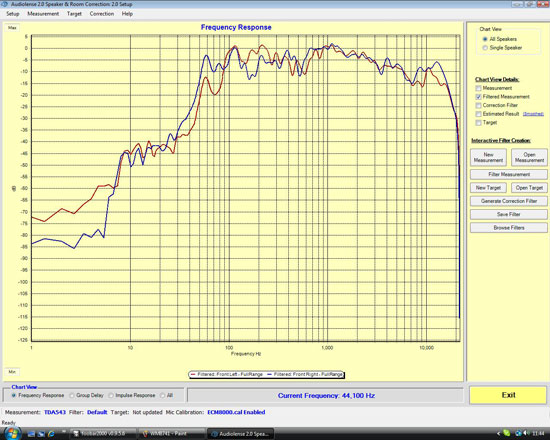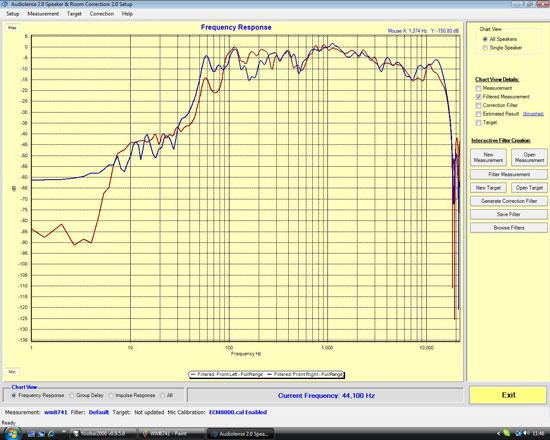Subjective Listening - Arrrgh!
For audio playback, we use Foobar 2000 alongside Windows Media Player. All music is transferred first to the hard drive in WAV format using Exact Audio Copy at a 4x read speed. Before we continue with subjective listening impressions, let's take a look at the measured room response of both DACs and listen to a couple of tracks without any DRC engaged.
The lowish output voltage of the passive I/V configured TDA1543 means we have to attempt to balance volume as best we can with the 2V output of the tube/transformer output of the Opus DAC for comparison purposes. After some adjustment and re-attempted measurements, we get a close enough match to see how the room responds to the Opus. Microphone gain and placement was kept at exactly the same point throughout the course of taking measurements. Each measurement was taken a number of times to see if any drastic changes could be observed.
Doede DAC Red=Left speaker, Blue=Right. Due to furniture placement, there is a 10dB offset between the channels at around 162Hz. |
The response is of the Transparence speakers with the TDA1543 is pretty much as expected, rolling off sharply under 60Hz and over 13.5k.
Opus |
Unsurprisingly, there's little to divide the two room sweep responses. The question is how both DACs sound when compared subjectively, both with and without DRC.
Listening tests are conducted using tracks from Maxwell's Urban Hang Suite and Embrya albums. Both albums feature music containing deep articulate bass lines, with vocals and instruments that should stress every part of the Bicone Signature frequency response.
Firing up "Til The Cops Come Knocking" on the Doede DAC first, the thing that strikes me is its directness. Soundstage height and depth can be best described as compact with a focused central image. This creates the perception of the vocalist sitting a couple of feet in front of the speakers. Instruments also have a "hang in the air" factor, without any real overemphasis on the finer details or decay of sounds. If "in your face" reproduction of micro details is important to you, you'll find you'll have to concentrate on hearing them with this unit in the loop. Everything's there, but you don't get buckets of spatial information that enhances micro-detail presence. Maybe that's the way it's supposed to be?
Rendition of high frequency sounds such as cymbals is on the smooth side compared to what I can recall from the Legato DACs of the Pioneer. I guess this may be a trait of non-oversampling. Overall, I'm quite impressed by the sound, considering the uncomplicated approach of Doede's implementation of the TDA1543. Subjectively, the sound has a very neutral character yet still manages to present itself without a fatiguing nature.
Now it's time to check out how the Opus fares in comparison. Both DACs are connected to the preamp simultaneously so that I can switch over quickly between the two while memory is still fresh. I spin up the same tracks from Maxwell and I'm amazed to find the perceived difference in presentation is far more apparent than I'd expected. The vocal forwardness of the TDA1543 is gone; the same vocal rendition sits further back between the speakers but has gained the impression of extending past the height of the baffles, and background instruments seem to have shifted back by a good few feet. The compact soundstage impression that the TDA1543 gave has been replaced with something far more expansive and spatial and the focus is now on all the elements of the recording. The finer details are readily apparent with the Opus; everything is projected in its own space and draws your attention. Mid-bass does not sound as prominent as it did on the TDA1543, the notes seem to be a little leaner and perhaps more analytical. Vocals and cymbals are especially alluring, something that we can put down to the sonic traits of the 3A5s on the output of the WM8741 DACs. To confirm the perceived differences I keep switching back and forth between the two units, each time amazed that the change is so apparent.










114 Comments
View All Comments
Olyros - Sunday, December 21, 2008 - link
What about Vista's digital room correction?I'd really like to see a comparison of the effectiveness of different DRC software on the pc, including Vista's own implementation.
Before reading this article DRC was off my radar, but now I'm really intrigued to try it out. However, reading this article one still doesn't know how he can use this specialized software with an application like Winamp or Vista Media Center. There's also no mention of all the impracticalities he might face like incompatible software, provisions for headphone use where DRC is not needed etc.
I think digital room correction on a computer could be a subject of an Anandtech article again.
Okos Bokos - Monday, December 15, 2008 - link
If you don't care about room, don't spend money on expensive equipment.Bass traps, diffusion panels (bookshelfs are perfect), position of speakers.
I used to play with all sort of best analyzers/equalizers, and it don't works.
In essence you can not treat time related problems (short reverbs that couses phase cancelations for eg.) with frequency related tools (equalizers).
My audio chain: CD – cables – amplifier – cables – speakers.
In 1998 I bought first pro audio soundcard, and changed CD with PC. I can not afford myself such good sounding CD player.
TV and home cinema is completily different issue.
Nice article... I had to make my first comment on AnandTech...
ccd - Thursday, December 11, 2008 - link
I'd love to hear from others on this issue, but my conclusions based on following thread on various forums is that the PC as a one box solution is far from perfect. The issues are as follows:
1) PC does not work as a source selector which means an external preamp if you want to use a source other than TV/cable and the CD/hard drive on the PC
2) Most solutions for volume control cumbersome at best, again requiring a preamp
3) Soundcards: the soundcards with the best DACs (ie Lynx) are not setup to act as just high fidelity soundcards. They are designed as studio mixers which makes them both expensive and hard to use for just good fidelity. Additionally, there are some formats that soundcards have not been able to decode. This is not because soundcards cannot decode, but that certain formats simply have not been available on soundcards.
4) DRC: I have not tried the software mentioned in this article, but I have tried other DRC software. My complaint is that the DRC software is not easily implemented for novices. You have to know more about using programs than I would like. Their effectiveness is a subjective evaluation, but stand alone processors are much easier to use, IMHO.
At this point in time, if I were to use a PC, I would use programs such as SoundEasy or the program available from ETFAcoustics to load a digital equalizer like the Behringer DCX 2496 for both digital crossovers and DRC. The PC is not a viable one box solution at this time as far as I'm concerned.
BTW: I should give the author the props he deserves. Most audiophiles who are into tubes and full range drivers would not touch DRC. This author not only touched it, but liked it. Hats off to you!
boredsysadmin - Wednesday, December 10, 2008 - link
I'm afraid this question will get lost in this rant war, but I'm still curios about this : How Does PC based DRC compares to ones built-in into new a/v receivers?P.S: CSMR is right on so many levels and IMHO combining ultra Hi-End speakers with DIY usb to analog kits seems a bit silly....
Rajinder Gill - Wednesday, December 10, 2008 - link
Depends if you're looking for a one box solution (which you obviously are). I have not seen much web based edict on the technical abilities of your standard budget-mid priced reciever based DRC. If it is scaled down somehow in functionality and attenuation, a double blind test against the software would prove if it's far behind.:) Judging by all the responses here, there should be some sites out there that have covered something around that idea.I only wanted something for my redbook playback and quick access to my tracks. Out on a limb yes, but that's just me.
egladil - Wednesday, December 10, 2008 - link
This article is just so typical for the pseudo-audiophile scene. There people do lots of very stupid things, including stupid subjective comparisons.For really good audiophile stuff, go to hydrogenaudio.org, there there is a rule: don't claim anything unless you have done double blind tests with significant positive results. Anything else is just too much influenced by placebo effects. Because of this reason this article is a case for a trash bin actually.
goshwan - Wednesday, December 10, 2008 - link
Yup,All musicians should not listen to their instruments at all, because it gives rise to subjective preferences. Subjective instrument choices by the individual should be outlawed. Every musician should by rights play the most scientifically perfect instrument. Subjective choices do not matter at all. We should all buy the same car based upon te pricinples of horsepower per dollar and most importantly 4 wheels touching the road. Don't you dare tell me that you have a favorite color!
We should all buy the same amps and speakers. Electronic engineers should be forced to adopt one single topology the world over. Further, no new product should enter the market place until the manufacturer can prove it's worth to the sinewave crew as offering something new and better than what's been released before. Product release shoul depend on approval by a team of government endorsed double blind testers.
Good luck in your quest!
phusg - Monday, December 15, 2008 - link
Hi there,I think you are confusing objective testing with equipment (over-rated) and subjective double-blind testing. Double-blind testing just takes out the placebo bias of knowing what hard/software set-up you are listening to. That doesn't make it objective, the assessor is still a human subject.
Regards,
Pete
ccd - Wednesday, December 10, 2008 - link
What is your issue with double blind testing??? If audiophiles are unable to tell the difference between $1000 speaker cable and $25 dollar speaker cable, isn't that worth knowing??? And what has double blind testing have to do with musicians not listening to their instruments or the rest of your rant???
Double blind testing can tell what people can differentiate (my speaker wire example) or what most people prefer. Personally, I think double blind testing is best for the former, not the later. Just because most people prefer something does not mean you would prefer it.
Rajinder Gill - Wednesday, December 10, 2008 - link
Wow, I never knew this stuff was going to continue on ad-infinitum when I wrote this piece. It'll please you all to know I have no plans to write another audio article. Anandtech will continue to concentrate on the computer stuff to the joy of many readers.I'm sure someone suitable will be found to take care of the soundcard stuff the way most of you would like to see it.
The gist of this article was basically to show that even someone as knotted up as me on certain gear could adopt DRC as something special and above lesser needs in the audio chain. Some people got that, others did not. I know I'm not the greatest conveyer of things in the written word, I did my best.
For the record, I also have solid state gear, so it's not all old-age beliefs. So let it go for the sake of your own sanity folks, there really is no winning these arguments.
Take care
Raja